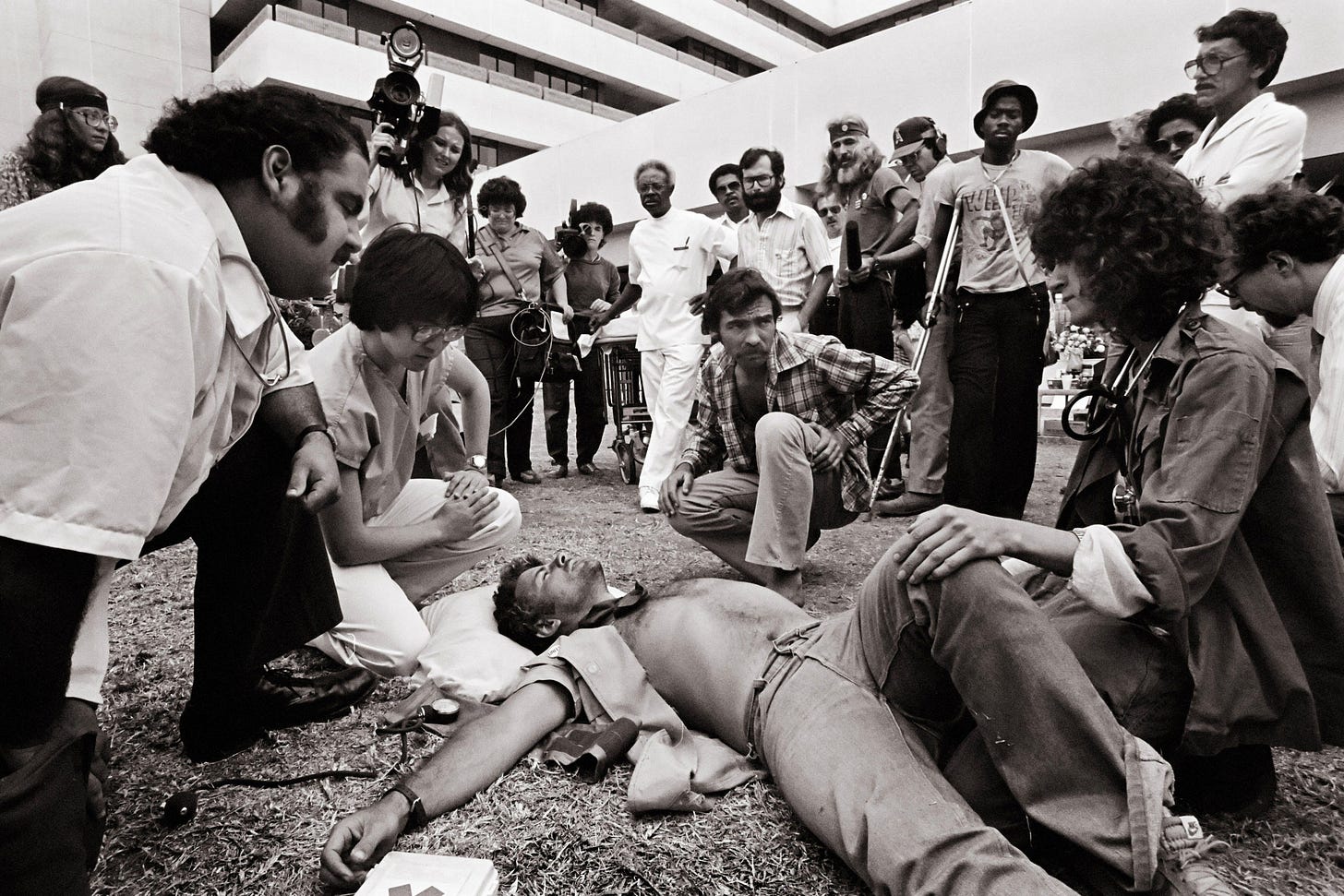On Veterans Day weekend, appeals court grants VA's request to halt building of homeless vet housing
The construction was being expedited so the temporary housing would be in place before LA's winter rains claimed the lives of more unhoused veterans.
On Friday, the VA persuaded the 9th U.S. Circuit Court of Appeals to stop site preparations for 100 units of modular housing to be built on the West LA VA campus. The homes’ construction had been ordered by U.S. District Judge David O. Carter, who was racing to have the temporary housing in place by Feb. 1, before the winter rains.
Local VA officials had agreed to build the units until the Department of Justice intervened, appealing Carter’s September ruling in favor of disabled veterans seeking housing on the property. The campus was deeded to the federal government in 1888 for the specific purpose of sheltering disabled soldiers.
The VA is due back in Carter’s court on Wednesday, Nov. 13, when he is expected to deny a pending request by the government for a stay pending its appeal. A full appeal could take years to resolve.
Long Lead has been reporting from Powers v. McDonough every day court has been in session, and we will continue to follow this issue in this newsletter. Subscribe here to get updates sent direct to your inbox as soon as they publish:
In court papers, the VA argued that Carter’s order adding thousands of housing units (including the 100 modular homes) to the 388-acre campus would upset its “balanced housing strategy” and overtax its $407 billion budget.
Veterans countered that without places to live, unhoused veterans will develop debilitating mental health issues, addiction or physical disease, and more will die in the streets. “The cost of Federal Defendants’ delay is the lives of veterans,” the papers said.
The VA estimated the initial cost of the modular units at $30 million, which veterans, in their court papers, described as a pittance of the department’s annual budget. They quoted Chelsea Black, acting chief of the campus’ facility and master planning, who at an earlier court hearing said that the VA wanted to produce the housing and would find the funding. Veterans also said the VA should go to Congress for more money for the housing, if the department doesn’t have enough funds.
Carter, after a non-jury trial, had ordered the VA to build 1,800 permanent supportive housing units and 750 temporary homes on the property, which at one time housed around 5,000 veterans. Carter also struck down campus leases the VA had negotiated for the Brentwood School’s athletic fields, UCLA’s Jackie Robinson Stadium, and Bridgeland Resources oil drilling operations.
Long Lead is proud to announce that “The Promised Land” is an official selection for The Veterans Film Festival. The 25-minute film provides an unflinching look at LA’s homeless veteran crisis, letting unhoused heroes give a street-level view of what life is like when your government leaves you behind.
The documentary short is part of Home of the Brave and was directed by Bronze Star Army veteran and documentary filmmaker Rebecca Murga.
The Veterans Film Festival is Nov. 14–15 at Bob Hope Patriotic Hall in LA. For more information, click here.
Around 3,000 homeless veterans, many with serious disabilities, live in the streets of Los Angeles County. Under a decade-old court settlement, the VA entered a lease with third-party developers to develop campus housing construction, but only 307 of 1,200 permanent supportive housing units promised under the agreement have opened.
In their court papers, veterans say 229 units of temporary or short-term housing are on or near the West Los Angeles grounds, and some veterans living in rent-subsidized housing may be required to become homeless again to qualify for campus units.
The VA asserted in its filing that building thousands more permanent supportive housing units would trigger “frequent mental health crises” and “widespread substance abuse disorders” that would make it impossible to safeguard veterans without making the campus “look like an armed camp.”
The veterans countered that those with complex mental health and substance use disorders are denied access to healthcare by the shortage of housing.
A 50-year battle for housing

At its peak in the late 1950s, the West LA VA campus housed around 5,000 veterans. Then, after a deadly 1971 earthquake and a flood of broken promises, the government ordered veterans living on the campus to vacate within a month. For the past 50 years, Los Angeles veterans have been fighting their own government in a battle for housing that’s still raging today. Learn more by reading Part Three of Home of the Brave: “The Land War.”
The VA is also trying to reverse Carter’s order barring it from renegotiating campus leases.
Under Carter’s supervision, veterans and the Brentwood School had reached a preliminary $5 million settlement that would allow veterans use of its pool, track, and weight room more than half the time. UCLA also upped its annual stadium rent offer to $600,000 after Carter lifted an order locking the university out of the stadium.
The government said it has the “unrestricted power… to determine with whom it will deal” and asserted that Carter was preventing the VA from receiving funds some unnamed “counterparties” have offered.
The VA said it will prevail on appeal, and contended Carter’s order will burden the agency financially and deny it the flexibility to solve the complex issue of veteran homelessness. “VA will not rest until every Veteran has a safe and stable home,” court papers said.
But veterans said the VA’s legal papers do little more than “rehash” the arguments Carter has already rejected. “As this Court found, the problem the VA currently complains of is tragically one of its own doing,” the veterans said, in their court papers.
The next hearing is scheduled for Wednesday, Nov. 13. at 11 a.m.









The VA's pleadings filed with the 9th Circuit as described in this story look, smell and taste like a venal temper tantrum on the part of VA Secretary Denis McDonough and U.S. Attorney General Merrick Garland and by their immediately subordinate political appointee underlings who run the VA and DOJ. Given their behind the scenes conduct in this case, I don't feel the least bit sorry for any of them losing their jobs on January 20, 2025 at Noon, though I doubt any of them will become homeless as a result. Donald J. Trump "loves to build apartment developments", now as a hobby. The supporters of disabled Veterans housing on the West LA VA North Campus need to figure out how to reach out to Trump and "pitch him" on building a ton of disabled veterans housing on the West LA VA North Campus if only to "stick it to" the affluent, entitled NIMBY Democrats who form the majority of the voting blocks in the neighborhoods like Brentwood Glen and the Barrington Corridor and the even wealthier surrounding Brentwood flats and canyons. "Step 1" is getting the Trump Administration and the majorities in the Senate and House to repeal the designation of the West LA VA Campus as an architectural/historic preservation area, to eliminate the VA intransigents' argument that "There's not enough room" for more housing on the West LA VA North Campus. There would be plenty of room if the old, ratty vacant buildings from the pre-Sylmar-earthquake era were simply torn down. Trump and his crew should like that ideaa since every apartment developer worth his salt will tell you that it costs far more to "renovate" old beat up apartment and low rise office buildings than it costs to tear them down and build brand-spanking new apartment buildings like the 2 new apartment complexes the VA's ground lessees just opened on the West LA VA's North Campus. I'm sure that in 18-24 months, Trump would relish coming to LA for a ribbon cutting ceremony for new veterans apartments which would also symbolize his vanquishing Democrat-NIMBYs who have rigged the development game over the past 10-15 years on this VA land.